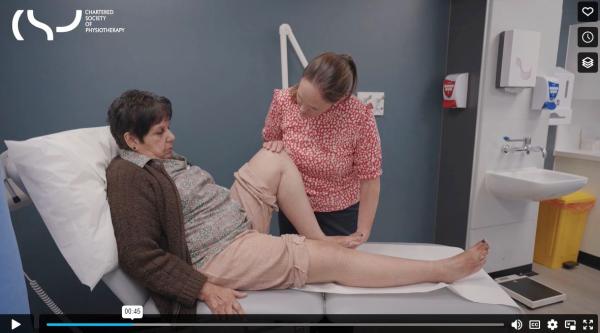The CSP has launched an inspiring case video resource, which highlights the benefits of embedding first contact physiotherapy (FCP) services into primary care settings.
The online video showcases an FCP service at Central Cheltenham PCN/Gloucestershire Health and Care Trust, which has achieved excellent patient satisfaction results and appreciative praise from GPs.
It features CSP member, Zoe Jones, a first contact physiotherapist who clearly loves her job.
Zoe is employed by Gloucestershire Health and Care Trust, who contract to Cheltenham Central PCN. She job shares with another physio in a 1.4 full time equivalent FCP post, which covers patients who are registered with six GP practices in Cheltenham (with a combined patient population of 54,000).
Describing her FCP work, Zoe says: ‘I really enjoy being at the front end of the musculoskeletal pathway, and feel that my consultation is making a real difference to starting patients off on the correct treatment.
We help to take capacity from the system and that frees up our medical colleagues to manage more medical patients
She adds that this approach to FCP allows patients to see ‘the right person, at the right place, at the right time.’
Outstanding patient feedback
The video also features Dr Olesya Atkinson, a GP and clinical director of Cheltenham PCN, who explains how integrating first contact physiotherapy into their GP surgeries has streamlined the MSK pathway, reduced the workload of other clinicians within the network and resulted in better outcomes for patients.
Speaking about her own and other GPs view of the service, Dr Atkinson says:
We love our FCPs…we know that their service is providing better care for patients and making a positive impact on our workload, and we also really like being able to have a second opinion from someone who has much more MSK experience than us
‘There are also additional benefits, beyond providing initial MSK assessments, because our FCPs are able to offer joint injections; they are independent prescribers, and they can also sign Fit Notes, which means they can advise people on returning back to work – and that isn’t something that is then passed on to GPs to do.’
Dr Atkinson adds that 95 per cent of patients who have accessed the service have reported that they would be very happy to use it again if they experienced any other MSK problems. In addition, feedback collected by the trust indicates that most patients rate the service as either “outstanding” or “excellent”.

Case studies platform
The new video adds to a range of written case studies, highlighting different service models and varying approaches to FCP, which CSP has compiled and made available here
These case studies aim to support anyone who is considering setting up an FCP service, as well as those who are already in the early stages of doing so, and members.
Influencing for FCP in your Primary Care Network
The case studies, along with the new video, can be used as influencing tools by members who are keen to gain support and funding from local decision makers, for more FCP roles to be embedded within PCN settings.
Members can also find guidance and support about embedding FCP here
Considering a career in FCP?
If you are inspired to consider a role in first contact physiotherapy (FCP) or a musculoskeletal (MSK) advanced practice role, you can find plenty of information in our FCP careers guide
It outlines career development routes you can take, with scenarios and country-specific guidance to help you explore different career paths into FCP across the UK depending on your current level of practice
Find Out More
Number of subscribers: 2



































